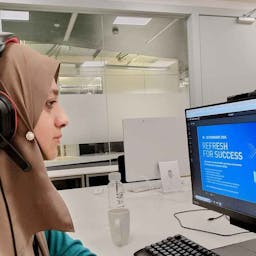If We Live Through To Tell The Story.
Aug 30, 2020
Story
2020 seemed to be a very promising year.
Everyone was making new plans. Then, COVID-19 pandemic struck.
It hit us when we least expected. It was sudden and unprecedented.
We slept in one world and woke up in an entirely new world. I cannot help but wonder how vulnerable and fragile our interconnected world can suddenly become, in front of a minuscule virus.
In the initial days, I was numb and could not bring myself to think anything. What was happening around me? I lay awake at night wondering what the future holds for us and our children. It took me a few weeks at least to gather myself to reflect.
At the very time, the pandemic occurred, I was at an important juncture regarding my personal and professional life. As a family, we were excitedly planning to visit our motherland Sri Lanka, after almost 2 years. My poetry book was at the publishers ready to be printed. I was to attend the IXth Conference on Childhood Studies at Tampere University, Finland, to submit my research paper on digital childhood.
The COVID-19 pandemic has brought the world to a standstill. Our priorities had to be shuffled and restructured. The spirit of the spring was long dead. The days are dark and uncertain. We are confined within homes in fear and isolation.
I retreated from everything I used to do and sought asylum in painting. I painted serene lakes and trees weighed down with blossoms of spring. But within myself, I was overwhelmed. I did not want to communicate with anyone. There was a hole of emptiness growing within me. I took the day to day cooking more seriously. Putting a lot of effort and focus and taking time to cook the regular curries and rice, I sought to stay sane when everything else was falling around me.
The world went fully online and people started to express their ideas and thoughts on how we could face this situation, what books we should read, and how to increase our productivity etc. That is all good, but one thing we should understand is not everyone is included in the term ‘we’. We all have our own different versions of what is right, and what is wrong. Though we all live on the same planet, our worlds are poles apart, our realities are different. We are governed by dissimilar laws and governments. Our social and economic experiences differ from person to person.
There is no one magic potion to overcome this stressful situation.
People around the world have lost their livelihoods and sources of income. Some people are worried about which can kill them first: COVID-19 or poverty – and it is no joke. According to research, the effects of the coronavirus pandemic will intensify existing inequalities in society.
We are talking about the digital divide. There is still a lot of the world that can’t access the resources digitally.
The UNDP’s Data on Preparedness presents indicators for 189 countries – including the level of development, inequalities, the capacity of a healthcare system and internet connectivity – to assess how well a nation can respond to the multiple impacts of a crisis like COVID-19.
‘While every society is vulnerable to crises, their abilities to respond differ significantly around the world.
The most developed countries – those in the very high human development category – have on average 55 hospital beds, over 30 physicians, and 81 nurses per 10,000 people, compared to 7 hospital beds, 2.5 physicians, and 6 nurses in the least developed country.
And with widespread lockdowns, the digital divide has become more significant than ever. 6.5 billion people around the globe – 85.5 per cent of the global population – still do not have access to reliable broadband internet, which limits their ability to work and continue their education.’
The COVID-19 pandemic has forced school closures in 191 countries across the globe.
It is said that half of all students currently out of the classroom – or nearly 830 million learners globally – do not have access to a computer. Additionally, more than 40 per cent have no Internet access at home. COVID-19 without a doubt is going to change global socio-political trends. It has challenged the basic elements of power politics and the existing world order. This ongoing outbreak will have long-term consequences on world politics. Similar to the phase terms post World War 2, post-Cold War and post-9/11, the current world order will be classified as the post-COVID-19 era.
Up to date, in the UK more than 26 000 people have bid goodbye to this world. 100 health personnel have sacrificed their lives. My husband works at the NHS, and his working hours have been extended. I realise that we are on the verge of vulnerability.
We need to do all we can to not just survive this pandemic. If we live through this pandemic, we could tell a great story to our grandchildren someday. If we do not make it, we shall bid goodbye to this beautiful planet with grace.
This is not the time to judge and give advice. We all need compassion, love, and empathy to hold on. We need to strengthen our systems and reinforce each other.
“We are now faced with the fact that tomorrow is today. We are confronted with the fierce urgency of now. In this unfolding conundrum of life and history, there is such a thing as being too late. This is no time for apathy or complacency. This is a time for vigorous and positive action.”
Dr Martin Luther King Jr




